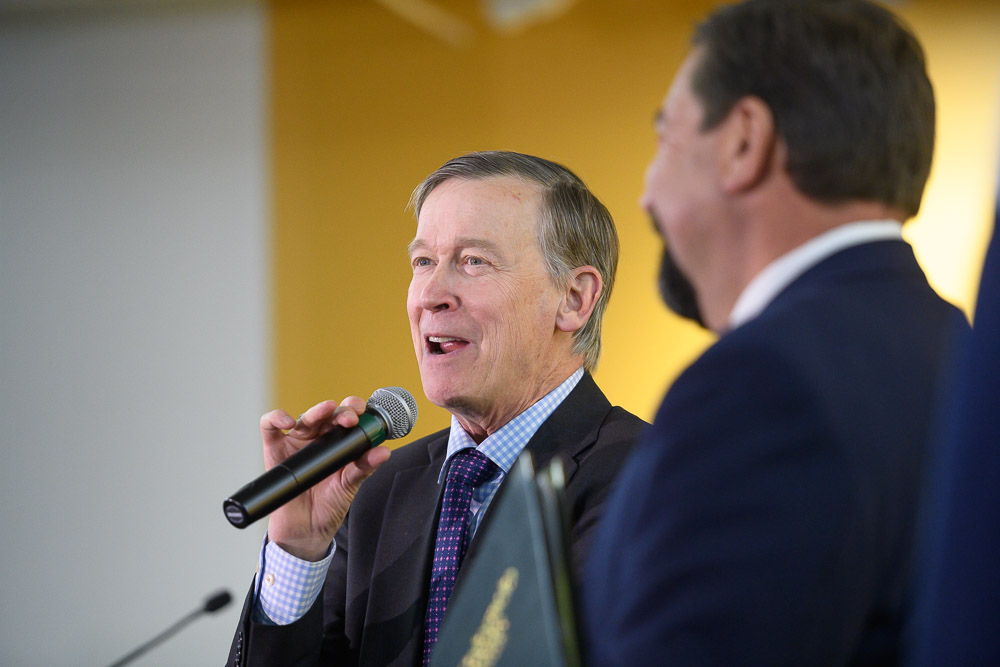
Colorado Gov. John Hickenlooper answers a question from CSU President Tony Frank at the Powerhouse. Photo by John Eisele
If the Colorado economy is to continue to grow over the next decade, business, education and government all need to work together to break down silos that keep students of all ages from acquiring the skills they need to be successful in the evolving workplace, according to Colorado Gov. John Hickenlooper.
“Businesses are already challenged to find the skilled workers they need,” he told a crowd of more than 100 business, education and elected leaders at the Colorado State University Powerhouse Energy Campus on Monday, Oct. 15. “Very soon, we estimate that three out of four jobs in the state will require training, certifications or credentials beyond high school; only about half of our citizens ages 25-30 have such certifications – and a bunch of them have moved here from somewhere else.”
Bridging this gap, Hickenlooper said, will require reinventing how society looks at education. That means not only engaging the entire education spectrum – including K-12, community colleges, skills training programs, and higher education institutions such as CSU – to collaborate, but also empowering students to understand that skills acquisition is their responsibility, and must be continuous.
“When you have a sense of what you want to do, education can provide the tools that let you do it; how you translate your skills into a job is up to you,” he said, drawing on his own journey from English major to geologist to pub owner to politician to illustrate how important it is to prepare for “when your profession disappears.”
The future is in innovation, something Colorado, and northern Colorado in particular, have invested in.
“When our economy was first starting out, what mattered was how hard you worked on the farm; then during the Industrial Revolution, it was how successful you can make your factory,” Hickenlooper said. “In the current economy, the process has been accelerated, and now the hard work is in intellectual innovation.”
‘Cultural revolution’ in learning
Business must support this next “cultural revolution,” he added, by providing opportunities for apprenticeships and other educational partnerships, as well as recognizing the earned skills workers bring with them to a job. He suggested developing an online platform where workers can keep track of their job skills as they earn them, as part of their professional profile.
“Without skilled workers – not just mechanical engineers but also skilled technicians who can keep the engines running – it gets harder and harder to attract entrepreneurs, who are the engines of our innovation economy,” Hickenlooper said.
There are also gaps in attainment among different segments of our population, he added, noting that students of color in the state lag behind their white peers in attaining post-secondary certifications. “Our goal is to have 66 percent of all our citizens to achieve such certifications,” he said. “Opportunity should not be defined by ZIP code.”
Education is opportunity
“Education is the pipeline to opportunity,” he said. “For the past eight years, we have worked toward equity in higher education, to see that everybody gets a fair shot at going to college, as well as being able to afford to finish their education. Equity is what America is all about, and we have to invest in the right places to make sure everyone gets that fair shot.”
The Colorado Opportunity Scholarship Initiative is one of those places the Hickenlooper administration has invested, matching local scholarship funds with state dollars one-for-one. Students whose family income is 250 percent or less of Pell grant eligibility can receive COSI scholarships; more information and application forms are now available at the state website.
Hickenlooper, who is term-limited and will be stepping down as governor at the end of the year, spoke at “Colorado’s Equity Imperative: Powering our Economy through Higher Education,” an event sponsored by the Colorado Department of Higher Education, the Fort Collins Chamber of Commerce, Aims Community College, Front Range Community College, the University of Northern Colorado and CSU.
“Collaborations between community colleges and high schools, and community colleges and universities, represent community building at its best,” he said.
After his remarks, Hickenlooper and Tony Frank, CSU president and chancellor of the CSU System, had a conversation about the governor’s time in office, how Colorado has navigated the Great Recession to emerge with such a robust economy, the outlook for higher education funding during the next downturn – and Hickenlooper’s plans when he leaves office.
“What we have done here in Colorado is so different from what has happened on the East Coast and the West Coast; it’s unique in so many ways, it’s time we start talking about it nationally,” he said.